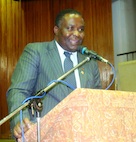Tax on the Poor Is to Compensate for Tariff Revenue Loss
Published on June 23, 2011 at 12:07 PM by FACE OF MALAWI

Finance Minister Ken Kandodo: The new taxes are to compensate for tariff losses due to regional integration commitments in SADC and COMESA.
By Claire Ngozo
LILONGWE, Jun 23, 2011 (IPS) – The decision by the Malawian government to introduce value-added tax (VAT) of up to 16.5 percent on products such as bread, meat, milk and dairy products is being blamed for losses incurred by small-scale businesses. The move comes in response to a loss of revenue due to regional trade commitments.
In the 2011/2012 national budget, delivered on Jun. 3, the country’s minister of finance, Ken Kandodo, announced the introduction of taxes that also include a 25 percent excise duty on used clothing, furniture and toys.
Benadette Mendulo has been operating a grocery store in Kawale, one of the most populous townships in Malawi’s capital Lilongwe. “Customers stopped coming to my store immediately after the announcement on the new tax measures was made in parliament. Bread, milk and meat were among the items that we used to sell most but this is no longer the case,” Mendulo told IPS.
The taxes came into effect straight away and wholesalers did not take long to increase the prices of goods.
“As retail traders we also had to respond to the adjustments and therefore increased the prices of bread, meat and milk. Many cannot afford to buy the products at the new prices. These are perishable goods and I have to sell them while they are fresh. I have made a lot of losses recently because it takes long before I sell them,” worries Mendulo.
Up to 60 percent of Malawi’s population of 13 million lives on less than one dollar per day and it is not easy for many to afford basic necessities. Bread, for instance, is selling at prices of between 0.80 dollar cents and one dollar, depending on the quality.
VAT is regarded as a retrogressive tax, especially in a context of endemic poverty, as it affects all citizens regardless of socio-economic status, which is why other countries have exempted basic foodstuffs.
Kandodo explained that the government was putting the new taxes in place due to regional integration commitments under the Southern African Development Community (SADC) and the Common Market for Eastern and Southern Africa (COMESA) where, he said, trade taxes are being phased out.
“Governments have now to increasingly rely on domestic taxes such as VAT since trade taxes will no longer be a significant source of revenue,” said Kandodo.
He also explained that other high taxes are being imposed on some goods to protect Malawi from hazardous practices such as dumping. “Government has therefore introduced a 25 percent excise duty on used clothing, furniture and toys,” said the finance minister.
Before the new tax measures, the Malawi Revenue Authority (MRA), the country’s tax body, imposed minimal charges, based on the quality and quantity of the goods traders were bringing into the country.
For the past three years, Mwandida Kalembera travels to China every two months where she buys household furniture and clothing that she brings back to Malawi and sells.
“The duty was not that high and I could bring into the country different kinds of furniture and clothes,” Kalembera told IPS.
“People could afford to buy the items but now it has become very expensive. And even if I could go now it would mean charging a lot more for the goods and very few people would be able to buy anything,” complains Kalembera.
Many traders who have been importing goods from China are women like Kalembera.
Opposition Member of Parliament Ezekiel Ching’oma has described the new tax measures as bad news for small-scale traders and big businesses.
Ching’oma said in parliament on Jun. 13 that the new taxes would punish the many poor Malawians who depend on small businesses to survive. “These new taxes show selfishness on the part of government,” said Ching’oma.
The Malawi Confederation of Chambers of Commerce and Industry’s (MCCCI) Chancellor Kaferapanjira, MCCI chief executive officer, told local media that the new tax regime would have a negative effect on business. “These new tax measures would only be acceptable in war,” said Kaferapanjira.
There seems to be no immediate hope for the local traders as government remains on the prowl for more sources of revenue following a significant drop in the finances that the country’s traditional donors commit towards the national budget. Over recent years up to 40 percent of the national budget has been dependent on aid.
But the past year or two Malawi’s donor relations suffered greatly following accusations that the southern African country has failed to respect the human rights of lesbian, gay, bisexual and transgender people and the right to freedom of the press. Donors refuse to release up to 400 million dollars.
Malawi is in the bad books of its traditionally largest donor, Britain, following a decision by the government to expel the British High Commissioner after he criticised president Bingu wa Mutharika for “increasingly becoming dictatorial” in a diplomatic telegram. (END)


